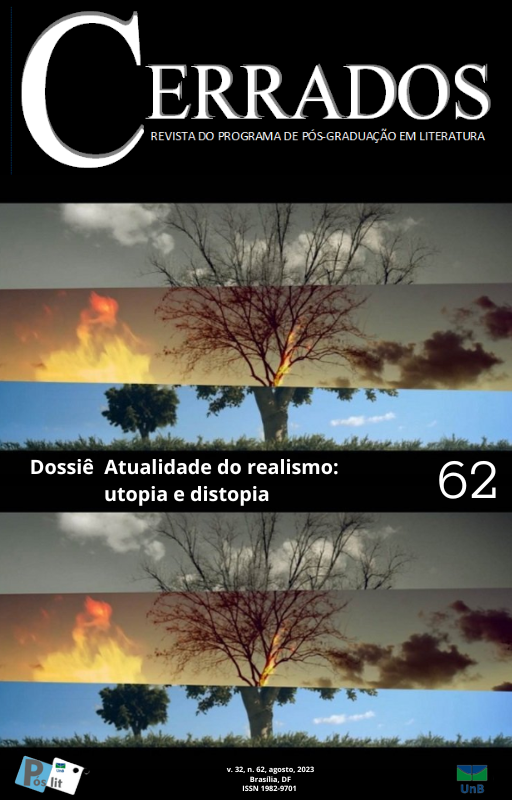Melancolia, utopia e figuras maternas em Natalia Ginzburg e Christa Wolf
DOI:
https://doi.org/10.26512/cerrados.v32i62.48870Keywords:
Keywords: Christa Wolf, Natalia Ginzbug, melancholy, utopia, mother figuresAbstract
We will analyze the maternal figures present in the novels The City and the House [1984] by Natalia Ginzburg and Cassandra [1983] by Christa Wolf, linked to pessimism and melancholy. At the same time, it is intended to investigate the utopian component linked to the maternal universe present in the works. The comparison is motivated due to the affinity between two authors biographically, aesthetically and ideologically very related and by the fact that in both stands out the presence of melancholy related to the denunciation of oppression of patriarchy and the alienation in Modernity.
Downloads
References
Referencias
BORRI, G. Natalia Ginzburg. Rimini: Luisè, 1999.
DRESS, H. A Comprehensive Interpretation of the Life and Work of Christa
Wolf, 20th Century German Writer. Nueva York: Edwin Mellen Press, 2002.
EAGLETON, T. Esperanza sin optimismo. Traducción de Belén Urrutia. Buenos Aires: Taurus, 2016.
GIOVANELLI, P. D. “Natalia Ginzburg: il silenzio, le pulci e lo specchio”. En: Lauretta, Enzo. Narratori italiani del Novecento. Ginzburg, Moravia, Bassani, Pratolini, Saviane, Soldati, Tobino: Premi Pirandello dal 1985 al 1991. Palermo: Palumbo, 1996, pp. 9-25.
GINZBURG, N. La città e la casa. Turín: Einaudi, 1997.
_,. Caro Michele. Introducción de Cesare Garboli. Turín: Einaudi, 2001.
_, La strada che va in città. Introducción de Cesare Garboli. Turín: Einaudi, 2000.
HILZINGER, S. Christa Wolf. Stuttgart: Metzler, 1986.
LEPENIES, W. Melancolía y utopía. Traducción de Juan Gabriel López Guix. Barcelona: Arcadia, 2008.
LÖWY, M. Walter Benjamin: Aviso de incendio. Una lectura de las tesis Sobre el concepto de historia. Traducción de Horacio Pons. Buenos Aires: FCE, 2002.
LOVE, M.N. Christa Wolf. Literature and the Conscience of History. Nueva York: Peter Lang, 1991.
LUKÁCS, G. El alma y las formas. Teoría de la novela. Traducción de Manuel Sacristán. México: Grijalbo, 1985.
MARX, K. Los Manuscritos económico-filosóficos de 1844. Introducción de Miguel Vedda. Traducción y notas de Fernanda Aren, Silvina Rotemberg y Miguel Vedda. Buenos Aires: Colihue, 2015, pp.7-42
PICARAZZI, T. L. Maternal Desire: Natalia Ginzburg's Mothers, Daughters, and Sisters. Massachusetts: Madison Teaneck-Fairleigh Dickinson University Press-London Associated University Press, 2002.
PREUßer, Heinz-Peter. “Heinz-Peter Preußer Projektionen und Mißverständnisse”. En: Text + Kritik 46 (1994), pp. 68-87.
ROSSBACHER, B. Beyond the “Dialectic of Enlightenment”: Kein Ort. Nirgends, Kassandra and Störfall”. En: -, Rossbacher, Brigitte. Illusions of Progress: Christa Wolf and the Critique of Science in GDR Women's Literature. Nueva York, Berna, Frankfurt/M: Peter Lang, 2000, pp. 115-156.
SMITH, C. E. Tradition, art, and society: Christa Wolf's prose. Essen: - Verlag Die Blaue Eule, 1987.
VEDDA, M. “Lo sublime en el joven Lukács”. En: Vedda, M. La sugestión de lo concreto. Estudios sobre teoría literaria marxista. Buenos Aires: Gorla, 2006, pp. 119-129.
WOLF, C.. Casandra. Madrid: Alfaguara, 1986.
WOLF, C.. Kassandra. Darmstadt: Luchterhand, 1989.
______. Voraussetzungen einer Erzählung: Kassandra. Berlín: Surkamp, 2008.
Downloads
Published
How to Cite
Issue
Section
License
Copyright (c) 2023 Revista Cerrados

This work is licensed under a Creative Commons Attribution 4.0 International License.
Proibida a reprodução parcial ou integral desta obra, por qualquer meio eletrônico, mecânico, inclusive por processo xerográfico, sem permissão expressa do editor (Lei n. 9.610 de 19/2/1998 )



